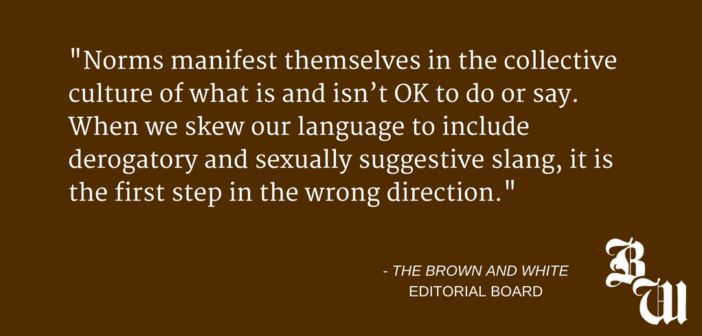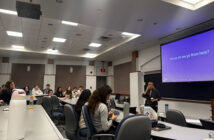All good things come to an end — some quicker than others.
Just five days into April, which President Donald Trump declared National Sexual Assault Awareness and Prevention month, he defended Bill O’Reilly’s $13 million in settlements concerning O’Reilly’s behavior in the workplace.
Even before Trump made his statement about the outspoken Fox News host, there was a social media outburst over the contradiction of someone who’s bragged about sexual assault working to stop it.
However, the condescension toward Trump is not what we should be focusing on. That will be remembered one way or another, whether it be in news archives or under dictionary listings of “irony.”
What we should really be focusing our frustrations on is the fact that during the month of April we have not been raising awareness about the crime we aim to fight. With all the focus on how ironic the situation is, active conversations about consent are not taking place. Some people seem to be missing that it’s an annual tradition for the president to proclaim this every April.
It’s a pity this reaction has taken over dialogue, because the culture that drives sexual assault is not an easy one to dismantle.
Why is this the case? Why would someone who didn’t have a disoriented moral compass even think about sexually assaulting someone?
Norms. Bystander effects. Silence.
Each of these terms logically implies the next, in a cruel continuum of social and psychological turnstiles.
Norms manifest themselves in the collective culture of what is and isn’t OK to do or say. When we skew our language to include derogatory and sexually suggestive slang, it is the first step in the wrong direction.
But no one wants to be the person who butts in during a conversation, for instance, to say it’s “not cool to talk like that.” Multiple people might be thinking the same thing, but it isn’t always enough, as the bystander effect encourages us to wait for someone else to speak up.
When the language and the culture are not corrected, sexual assault prevention becomes a much greater issue to deal with. We need to stop the .
If you didn’t catch that, it was silence.
And what does Lehigh do to combat the slippery nature of language in this culture? It requires students to take cookie-cutter harassment training courses that polarize situations that are largely gray. It facilitates conversations for Greek chapters that inform students of definitions without forcing productive back-and-forth.
By implementing such ineffective programs, the problem actually gets worse. It makes sexual assault feel foreign — almost impossible to happen unless it is premeditated. And when students are told exactly what is considered wrong, they don’t introspect about their actions unless they are mirroring the dramatically wrong ones.
Please don’t underestimate how many incidents of sexual assault occur without malicious intent and still cause great harm. Everybody knows the “1 in 5” statistic. Some call it overused, but its presence will remain perfectly adequate until improvements are made.
Amid all the noise, one campaign has truly embodied a step toward education on, and solutions to, sexual assault. Joe Biden shared a video as part of the It’s On Us campaign that autocorrects a text conversation to reflect the motives of sexual assault hidden in the language of someone recapping their night at a party.
Here at Lehigh, which has been consistently rated as a top party school, it is time we start unpacking the issues in a Biden-esque manner. Instead of pointing out the blurred lines, we need to make them clearer.
It is on the students to do this. As much as administrators care about the problem and have tried to address it, everyone knows they have little, or possibly zero effect on the campus climate.
In the short term, that means focusing on a case-by-case basis to address situations while we work on the bigger issue. For example, Greek chapters should make sure they are keeping close eyes on guests at their parties.
In the long term, it means transforming the bystander effect into bystander intervention. When just one person intervenes, it clues in others who were apprehensive about taking action. It also lets them know there are people actively working to change these norms.
The interventions must be as contagious as the silence that prompted them. Then we will see progress.





Comment policy
Comments posted to The Brown and White website are reviewed by a moderator before being approved. Incendiary speech or harassing language, including comments targeted at individuals, may be deemed unacceptable and not published. Spam and other soliciting will also be declined.
The Brown and White also reserves the right to not publish entirely anonymous comments.